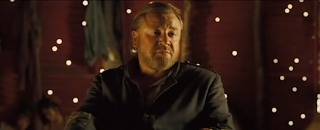James Woods did not receive an Oscar nomination for portraying Maximilian 'Max' Bercovicz in Once Upon a Time in America.
James Woods portrays one of the four friends who slowly become important crime figures during prohibition in New York City. He is the leader of the group along with Noodles (Robert De Niro) who come up with the strategies of the group to give them greater power in the underworld. One of the main focuses of the film is the friendship between Noodles and Max as they commit crimes through the years. What also is important is how their friendship slowly changes through the years, and particularly the type of man that Max becomes as well and how that differs from the type of man that Noodles becomes.
Woods is a very strong presence in the film and he creates an important dynamic with De Niro in the film. Woods casting here is necessary as Max really needs to stands on the same ground as Noodles, and Woods has the right command of the screen to easily stand toe to toe with De Niro. Max is the supporting character of course, and he really is not given the personal scenes that Noodles is given, but that does not matter in Woods's portrayal. Woods in all of scenes takes a strong grasp of the part never letting go in creating an especially compelling portrait of man seeking power no matter the cost.
Noodles in his crimes mostly just seems to want to commit the crimes for wealth, and only really power to the point that it gives him more freedom to do whatever he feels like. Woods portrays Max differently in that there is always a tremendous amount of ambition that seems to bubble below the surface within Max. Woods infuses it into his performance marvelously throughout the film. At first when he first welcomes Noodles back into the fold, Woods shows Max mostly as a gangster enjoy what he does, but in subtle moments portrays the incisive looks of a growing want for more than his current lot.
As the film progresses Woods does a wonderful job of slowly growing in this quality of Max that propels him further into a seeming insanity at times possibly. Woods is terrific in portraying the growing intensity in Max he seems less and less likely to give up on his attempts to gain more power, even as Noodles becomes far more content with his position. Woods is excellent because he not only shows the ambitious growing in Max from his outwardly intensity, but as well is how more internally his warmth towards Noodles as friend slowly seems to start to seize.
Woods and De Niro are both very effective creating the friendship almost entirely through silent looks they give one another to indicate their common bond. Woods though succeeds in portraying the coldness of Max growing as he simply stops showing the same familiarity Max usually displays towards Noodles. This is a strong performance during most of the film, but what makes this performance is a great one is his last scene. It appears from the beginning of the film that Max is dead from the start do to Noodles warning the police of a heist planned by Max, and Max apparently was killed in a battle with the police.
In the end of the film (
spoilers) it is revealed that Max is very much alive now called Secretary Bailey a very powerful rich man, married to Noodles's old girlfriend. He seems to be doing quite well other than the fact that he is wanted for a criminal investigation, and his fellow criminal wants him dead to keep him silent. Woods is outstanding in his depiction of Max at the end, not showing Max to be a man happy with all the power he has, but instead a haunted shell of a man.
His final conversation with Noodles as he tries to convince Noodles to kill him for money is possibly the best scene in the film. Woods is terrific as he creates the history of Max, even though we do not see it, simply through his performance in this one scene. Woods shows that his ambitious has brought him to a basic nothingness of himself, other than just a hatred for himself due to his actions. Again De Niro and Woods are just about perfect together in the unspoken relationship the two share, as they stare at one another after so many years after appearing to betray one another. Woods creates a compelling depiction of Max, and brilliantly creates the dark path of his ambition.


























































